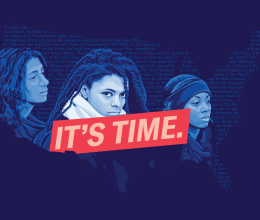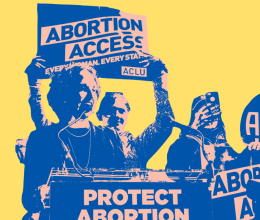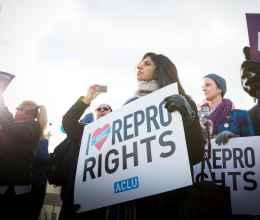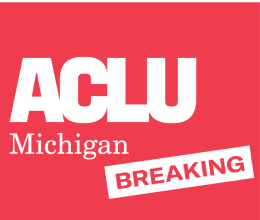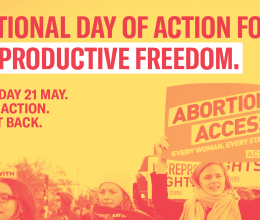DETROIT – In a letter today, the American Civil Liberties Union of Michigan and the Fair Housing Center of Southeastern Michigan demanded that the Inkster Housing Commission halt the eviction proceedings of a pregnant woman facing eviction because she reported incidents of domestic violence to police.
“Putting a pregnant woman and her kids out on the street before Christmas because of the actions of her abuser is cruel and unconscionable,” said Michael J. Steinberg, ACLU of Michigan legal director. “The Inkster Housing Commission must put an end to this illegal policy that re-victimizes women and reinforces the dangerous stereotype that women who experience domestic violence must be allowing it to happen.”
The tenant, Allison Ben, has been attacked on a number of occasions in her apartment by the father of her child, Larry Gee. Despite the fact that Ms. Ben received personal protection orders against him in 2009 and in 2013 and he has been convicted of domestic violence against her, the Housing Commission considers him her “guest” and is therefore evicting her for the “disturbance of the peace” and damage he caused to the apartment in the process of assaulting her. See a photo of Allison.
In the spring, Ms. Ben called the police when Gee tried to enter her home. After the Inkster Housing Commission police officer ordered Mr. Gee to leave, the officer told Ms. Ben that she risked eviction if she made similar calls in the future. In July, Mr. Gee forced his way into the apartment through the patio door and began to punch Ms. Ben in front of their daughter. After a struggle, Ms. Ben called the police. The police eventually arrested Mr. Gee and he was convicted for domestic violence. The police officer for the housing commission reminded Ms. Ben that she should refrain from calling the police about any further assaults because the housing commission would evict her from her apartment.
Later in the summer, Mr. Gee once again forced his way into the apartment and brutalized Ms. Ben by pulling her by the hair up the stairs and punching and kicking her repeatedly. Fearing that she may be evicted, Ms. Ben did not call police. A few days later, Ms. Ben saw Mr. Gee outside of her apartment and feared for her life. She called police who asked Mr. Gee to leave. After this last incident, the Inkster Housing Commission informed Ms. Ben that she was being evicted because she could not control her guests and claimed that people like Ms. Ben were ruining the neighborhood and did not deserve to live there.
“The policy of evicting domestic violence survivors has the perverse effect of giving batterers the power to exercise control over women and make them homeless,” said Pamela Kisch, director of the Fair Housing Center of Southeastern Michigan. “It is time to put an end to this practice, not only in Inkster, but throughout the state.”
In the letter the ACLU of Michigan and Fair Housing Commission urge the housing commission to halt the eviction proceedings and amend its policies or risk violating federal and state laws including the federal Violence Against Women Act, the Fair Housing Act and Michigan’s Civil Rights Act.
According to the letter: “Rather than work with Ms. Ben to ensure that she and her child are safe, the Inkster Housing Commission has re-victimized her by attempting to evict her from her apartment – not because of anything she did, but because her batterer ‘disturbed the peace’ and caused damage to property in the process of beating her up. . . Furthermore, evicting Ms. Ben during the holiday season for this reason is particularly cruel given that she is pregnant and due to give birth on December 20.“
Over the years, the ACLU has successfully challenged similar policies across the country.
In Michigan, the ACLU brought a federal lawsuit in 2007 against an owner, management company, and housing manager in Detroit on behalf of Tanica Lewis, a tenant who was evicted based on the conduct of her abusive ex-partner. The case settled and the management company adopted a comprehensive policy addressing the rights of survivors of domestic violence, dating violence, sexual assault, and stalking, including giving tenants the right to early lease termination and relocation.
In 2003, the Ypsilanti Housing Commission agreed, after the ACLU and Fair Housing Center intervened, to end a policy that led to the eviction of Aaronica Warren. The Ypsilanti Housing Commission had relied on a “one-strike rule” in its lease that permitted it to evict tenants if there was any violence in a tenant’s apartment even if the tenant was the victim of the violence.
Key News and Documents
Read our letter to the housing association urging them to treat victims of violence fairly.
STATEMENT
TAKING ACTION AND SUPPORTING COMMUNITIES UNDER ATTACK.
